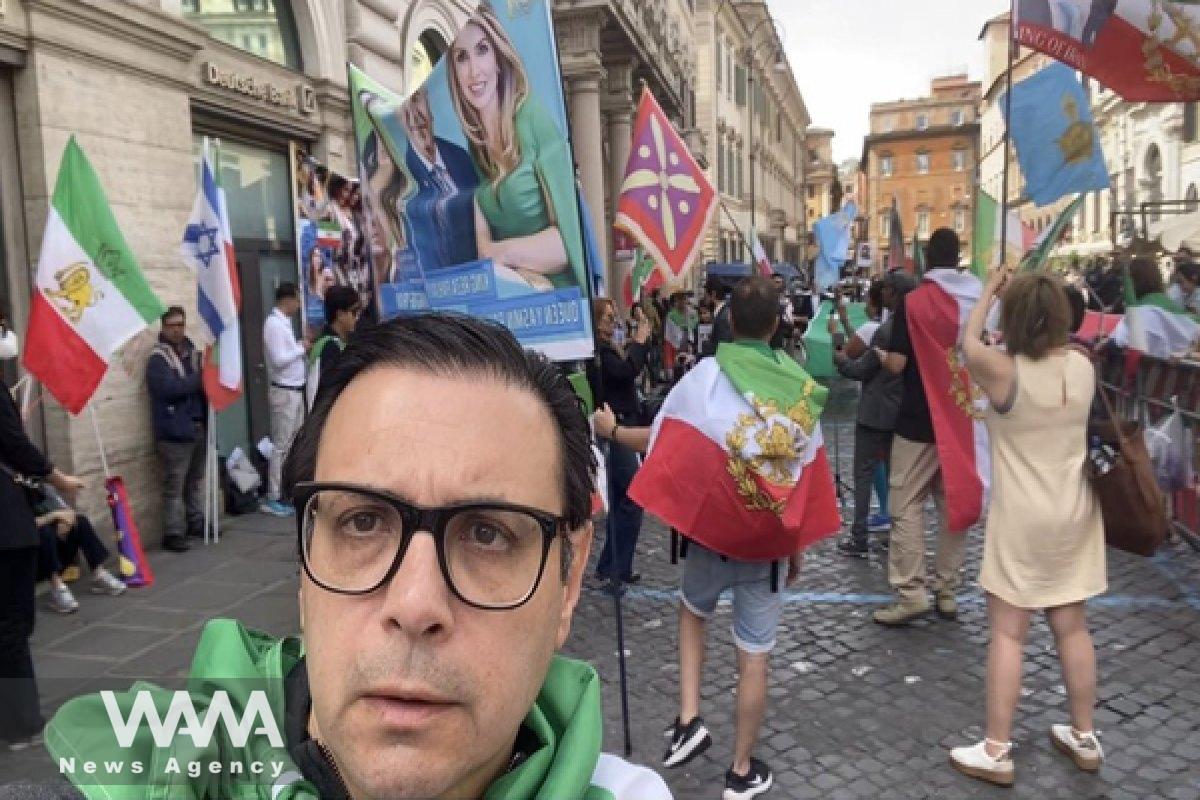Iranian Opposition vs. Iran’s National Interests
WANA (Apr 21) – As a new round of indirect negotiations between Iran and the United States kicks off in Oman and later in Rome, various factions of the Iranian expatriate opposition — despite their long-standing differences — have found common ground in a shared goal: campaigning to sabotage Iran’s diplomacy. Monarchists, the Mojahedin-e Khalq Organization (MEK — a designated terrorist group operating against the Iranian government from abroad), and parts of the Persian-language media outside Iran have launched a coordinated effort to discredit the Iranian negotiating team and disrupt the talks. But what does this unlikely alignment actually mean, and what fuels it? The answer is more complex than the familiar chants of “Death to the Islamic Republic.”
A key question arises: What could bring monarchist royalists and the radically leftist MEK to the same table? The answer lies in what Marco Rubio recently revealed: Money.
In a controversial statement, Rubio disclosed that some Iranian opposition groups spent only 12% of the foreign funding they received on actual activities. The rest went to personal expenses, travel, cult-like propaganda, and even infighting. With Western financial support to these groups dwindling, they have fallen back on familiar tactics to stay relevant.
The louder the noise and the greater the unrest these groups generate, the bigger their share of this “crisis capital.” This is precisely where even sworn enemies temporarily become allies.
During the second round of Iran-U.S. indirect negotiations, a group of monarchists staged a protest near the venue — not in solidarity with the people, but to intensify international pressure on Iran.

A group of monarchists staged a protest near the venue of Iran-US indirect talks in Rome / WANA News Agency
Reza Pahlavi (the son of former Iranian Shah Mohammad Reza Pahlavi), in his role as the monarchist figurehead, issued a statement calling for “maximum pressure” on Iran — even though the negotiations were meant to ease that very pressure and create opportunities for economic engagement.
Perhaps the most revealing point in all of this isn’t the opposition’s level of influence, but rather how they define “national interest.” What we see today is a deliberate crossing of both moral and national red lines. As Iranians face sanctions, inflation, and economic hardship, public calls by fellow Iranians to increase pressure have gone beyond political activism — into the realm of collective punishment.
Sadegh Zibakalam, a political science professor and longtime critic of the Iranian establishment, wrote in response: “They hope that war will bring about change, and that His Excellency (Reza Pahlavi) will come to power — even if all regime supporters are hanged.” A statement that underscores the fact that even within the camp of critics, such unpatriotic conduct does not go unanswered.
Report on the Rome Talks – Part Two:
1. Some Iranian counterrevolutionary groups, incited by the Israeli regime, held a gathering against the negotiations in Rome.
2. The Iranian side’s steadfastness on its positions has led the United States to adopt more realistic views.
3.… pic.twitter.com/OoGQZI23rx
— WANA News Agency (@WANAIran) April 19, 2025
Meanwhile, the MEK has taken its own steps to undermine Iran’s diplomacy. They’ve spread bizarre claims — like a gold-plated pen being stolen by a member of Iran’s negotiating team — and circulated a leaked audio recording attributed to Ayatollah Montazeri (a well-known dissident cleric) concerning the mass executions of the 1980s. BBC Persian, in apparent coordination with opposition forces, published the audio and helped amplify suspicions about Iran.
Ironically, monarchists and terrorist factions like the MEK stand on opposite ends of the ideological spectrum — one rooted in hereditary monarchy, the other in a bloody history of assassinating thousands of Iranians. And yet today, they are bound by a shared objective: undermining Iran and derailing the talks.
Political analyst Ghasem Yekleh calls this phenomenon “emergency alignment”: “Even when they’re fighting among themselves, they sit together to tear Iran down.”
This isn’t the first time domestic or foreign actors have tried to exploit internal unrest to boost their own status. As the experiences of Iraq, Libya, and Syria have shown, foreign pressure may bring about superficial change — but it’s the people who end up paying the price.

Iran’s Opposition: From Efforts for Unity to Internal Collapse
WANA (Sep 16) – Did you know that over 90% of political movements that act as opposition to established governments gradually disintegrate due to internal conflicts and ideological differences? The Iranian opposition camp is no exception to this rule. Groups that once united with the hope of overthrowing the government have now disintegrated to the […]
The failed “Charter of Solidarity” during the 2022 Mahsa Amini protests — which didn’t even last a full season — exposed the deep structural weakness of the Iranian opposition. Despite billions in funding and hundreds of hours of airtime, they have neither a credible alternative to offer nor a shared vision for the future. But whenever there’s a chance to pile pressure on Iran, they temporarily set aside their rivalries, like two factions of a defeated army, willing to cooperate only during retreat.
The release of Montazeri’s audio, the pen theft claim, efforts to label the IRGC as a terrorist organization, and formal appeals for intensified sanctions — all of these feed into the strategy of positioning these groups as tools of pressure in diplomatic settings.
What may seem like an “ideological rift” is, at its core, nothing more than a struggle for relevance — for visibility, for survival, for more funding. The alliance of monarchists and regime-change groups against Iran’s diplomacy is not a sign of strength, but a symptom of structural weakness. An opposition that rises only when Iran is building — to try and tear it all down.













